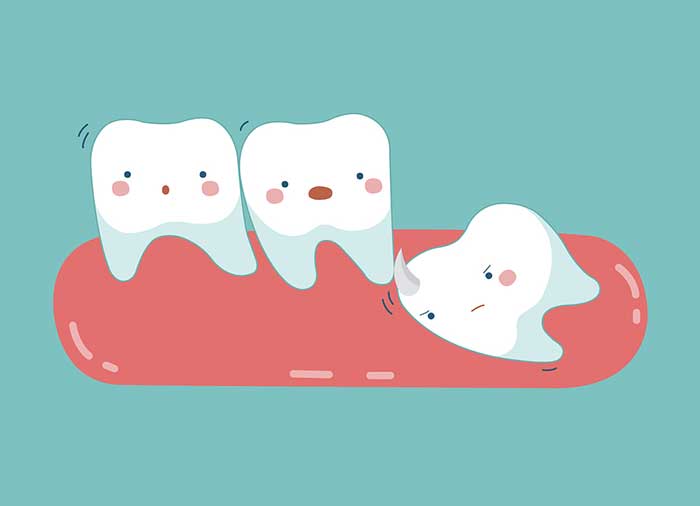
Your wisdom teeth, also known as your third molars, are the largest teeth in your mouth, and in ancient generations, they served an important purpose. In modern humans, however, they’re more likely to cause trouble than function properly, so many patients choose to have these teeth extracted by an oral surgeon before any issues can occur.
Why Do I Have Wisdom Teeth? Why Do They Become Impacted?
Our earliest human ancestors ate foods that were far more fibrous and difficult to chew than anything in our diet today. These third molars were necessary to help to process those foods, and they also would replace teeth that were lost to wear and tear, which was much more common in those times.
These early humans had plenty of room for their third molars to erupt properly. Their jaws were larger, and additional space was created as teeth fell out from disease and wear and tear. However, jaws have evolved to be smaller and more narrow in modern humans, and we keep our biological teeth well beyond the age of wisdom tooth eruption (typically in the mid-to-late teen years). Most people don’t have enough room in their jaws for the wisdom teeth to erupt, and they become impacted as a result.
What Are the Benefits of Having My Wisdom Teeth Extracted?
Impacted wisdom teeth can cause numerous problems for patients, including infections, abscesses, cysts, and tumors. As they continue to try to push through the gums, they can cause significant discomfort and damage to surrounding teeth or push them out of their proper position. While a dentist can determine whether the wisdom teeth are impacted in a patient’s early adolescence, it’s impossible to predict when a problem may occur. Furthermore, wisdom tooth extraction is less complex in patients under age 25, so many people will choose to have the procedure in their late teens or early twenties.
An oral surgeon typically performs this procedure because bone and other tissue surrounding the impacted tooth must be removed before the tooth can be accessed and extracted. The procedure is completed in a matter of hours, and patients can resume normal routines in a few days, as long as no complications arise. Your surgeon will give you detailed instructions about caring for the extraction site to prevent complications.
If you are in your late teens or early twenties and haven’t yet considered wisdom tooth extraction, we encourage you to visit our Asher Aesthetics & Multispeciality Dental Clinic

Recent Comments